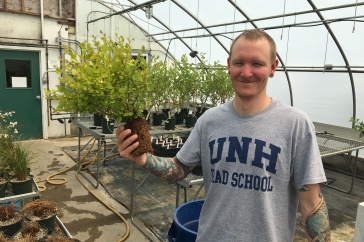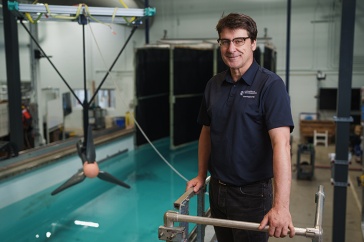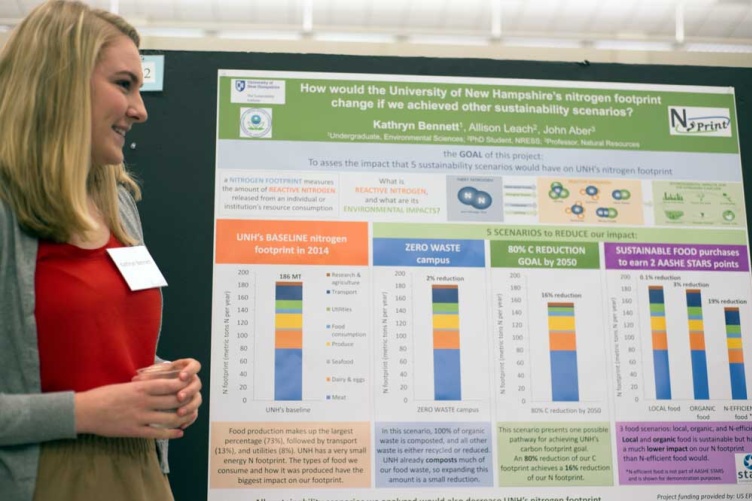
Kathryn Bennett '19 presents her sustainability research at the COLSA URC.
UNH is known for its sustainability efforts — after all, the university’s Sustainability Institute is the oldest endowed sustainability program in the country, and UNH's carbon calculator is in use on 1,000 college campuses nationwide. But one student decided to take those efforts a few steps further.
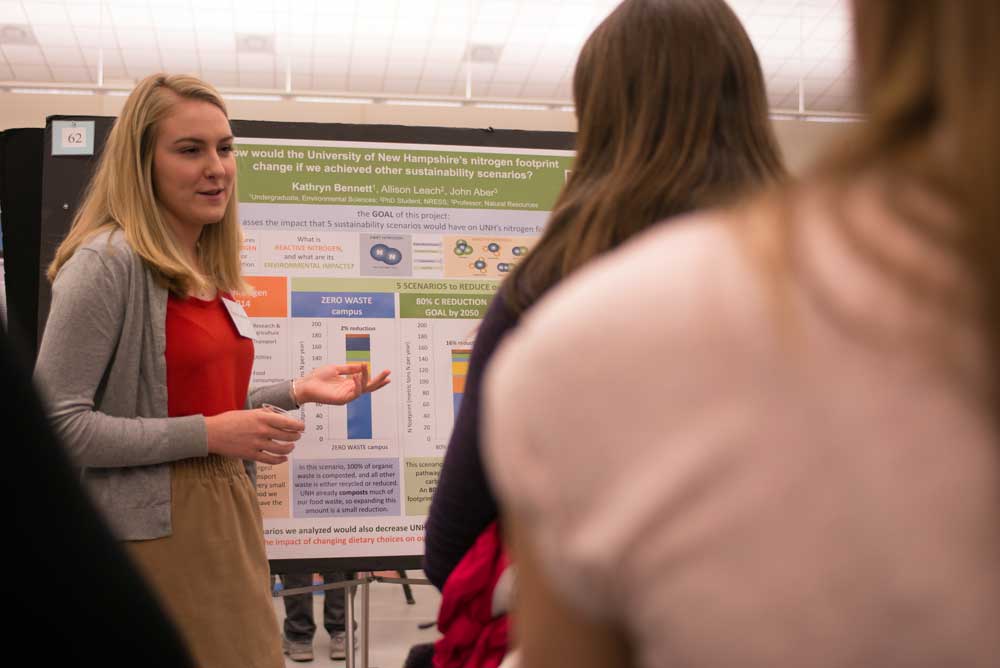
Kathryn Bennett ’19 is taking her commitment to sustainability on the road this summer through a 2017 Social Innovation Internship.
“I am incredibly excited to be working with Thornton Tomasetti at their office in Portland, Maine, in their corporate sustainability department,” Bennett says.
Thornton Tomasetti is considered one of the most sustainable firms in the architecture, engineering and construction field, and Bennett's internship will include work on two major sustainability efforts.
“The first is a project to support a program that they already have in place to promote sustainability in their offices around the world,” Bennett explains. “The goal of this program is to improve green practices in the offices themselves, increase employee engagement in these practices and create opportunities for employees to volunteer in their communities.”
For the second project, Bennett will work with Thornton Tomasetti’s technical team to revamp its carbon-mapping tool to make it more functional and user-friendly.
"My work with them will help me to learn more about ways to incorporate sustainability at the corporate level," Bennett says.
Interested in applying for a 2018 Social Innovation Internship? Learn more here.
For Kathryn Bennett ’19, a student in the College of Life Sciences and Agriculture (COLSA), an interest in sustainability began at a young age.
“I have always been passionate about protecting wildlife and our natural world,” the Medway, Massachusetts, resident says, explaining how she would spend summers camping with her family during her childhood. “This year, I became more involved in sustainability because I want to help protect and improve our world for ourselves and for future generations so that everyone can have the opportunity to love and appreciate nature like I do.”
Bennett took an introductory-level sustainability course with lecturer Vanessa Levesque and came to recognize sustainability is not simply respect for the natural world.
“It also involves making sustainable economic and social decisions,” Bennett says. “This realization has only helped to fuel my passion and inspire me to continue my work to help educate and inspire people to help make our world a better and greener place.”
Bennett delved into her research by examining the current status of the UNH campus — sparking an intensive study that she recently shared during the Undergraduate Research Conference (URC).
“Throughout the school year, I worked with Allison Leach at the Sustainability Institute to calculate UNH’s nitrogen footprint for fiscal year 2016, which is what led to this project,” Bennett explains.
Her goal? “To relay to people how different choices could decrease our footprint and improve our sustainability, and which options have the biggest impact.”
Her URC project examined different sustainability scenarios, assessing the potential impact on UNH’s nitrogen footprint, the term for “the amount of reactive nitrogen that is released into the environment as a result of our resource consumption,” Bennett explains.
“The scenarios that I looked at were becoming a zero-waste campus, achieving our 2050 goal of an 80-percent carbon footprint reduction and increasing our sustainability purchases to earn two AASHE (Association for the Advancement of Sustainability in Higher Education) STARS (Sustainability Tracking, Assessment & Rating System) points in one of three areas: local food, organic food or N-efficient (nitrogen-efficient) food that uses best-management practices to minimize nitrogen outputs from food production,” she says.
Bennett presented her findings at the COLSA URC at the end of April.
“I compared each scenario to our campus baseline footprint from fiscal year 2014 and found that each scenario would result in a reduction of our footprint but to different degrees,” she says.
Based on the assumption that the campus would continue to purchase the same amount of food but change 30 percent of it to the sources Bennett was examining, she learned that the greatest result would come from converting to N-efficient sources. However, she notes that would not be easy: “There is no certification for N-efficient food,” she explains, so UNH would need to research “the practices of each farm that we are supplied food from. This also saw the greatest reduction because it impacts the part of our footprint that consists of food production, which is the largest percentage of our baseline footprint at 73 percent.”
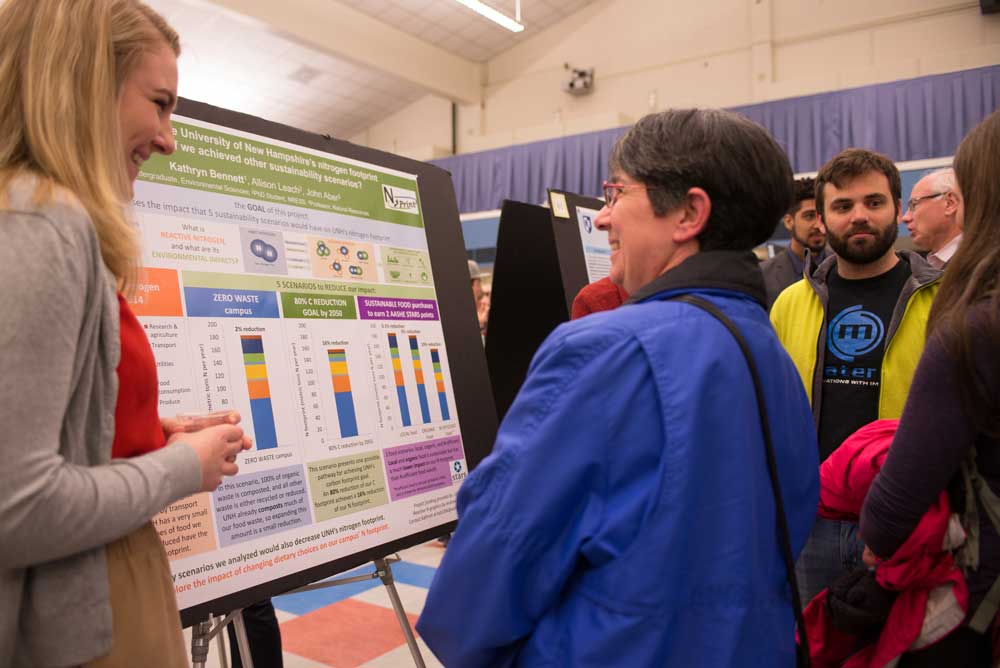
That, however, was not what surprised Bennett the most in her research.
“My most unexpected finding was that becoming a zero-waste campus would only decrease our nitrogen footprint by two percent,” Bennett says, adding, “After investigating this further, I found that a large part of why the reduction would be so small is because UNH already does an excellent job of minimizing our food waste and composting a large amount of it from our dining halls. Scaling the amount of organic waste composted up to 100 percent isn’t as big of a jump as it would be if we were currently at zero-percent composting.” And, she points out, “composting doesn’t eliminate the nitrogen released into the environment during food production; it only eliminates the last part of nitrogen released from waste. To see a bigger reduction, we would need to decrease nitrogen released during food production as well.”
Going forward, Bennett, who in addition to her sustainability work on campus is also a member of the Ski and Board Club and vice president of Alpha Xi Delta, remains dedicated to sharing her passion for sustainability with the people she meets.
“I think one of the most important things to remember about sustainability and protecting our planet is that while these issues can seem very daunting and impossible to solve, there is no action that is too small to make an impact,” she says. “Each of us can make a difference just by changing our daily choices to become more sustainable, and if we work together and share this knowledge, there is no limit to what we can accomplish. Every solution has to start somewhere, and an easy way to start is to just get involved!”
-
Written By:
Jennifer Saunders | Communications and Public Affairs | jennifer.saunders@unh.edu | 603-862-3585















































